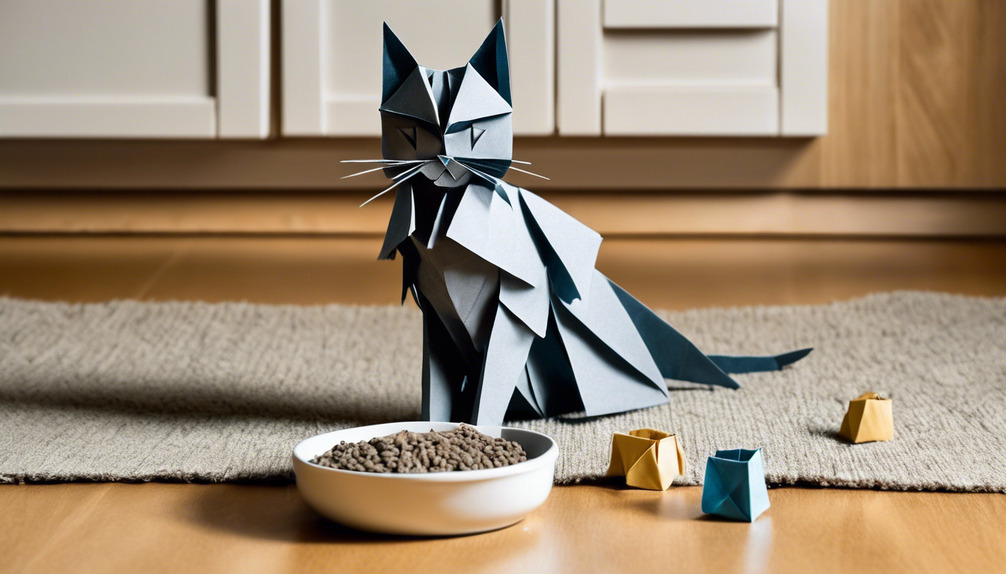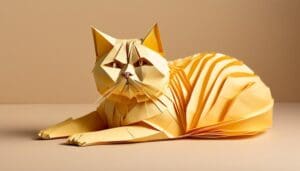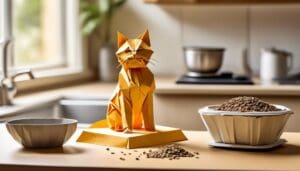You’ve likely heard the saying, ‘An ounce of prevention is worth a pound of cure,’ and when it comes to your aging cat, this couldn’t be truer. As they step into their golden years, it’s essential to realize that their dietary needs aren’t what they used to be.
You’ve watched them slow down, and their once boundless energy now reserves itself for peaceful naps in the sunlight. Adjusting their meal portions isn’t just about responding to lessened activity; it’s about preempting health issues that can arise from overfeeding, such as obesity, diabetes, and joint stress.
With a careful eye and a gentle hand, you’ll need to gauge their nutritional intake to keep them purring contentedly for years to come. In doing so, you not only honor the bond you share but also proactively contribute to their overall well-being.
Key Takeaways
- Senior cats have diminished energy requirements and their caloric needs shift as they age.
- Monitoring weight, body condition, and appetite fluctuations is important for managing overall health in older cats.
- Consulting with a veterinarian is crucial to tailor a feeding plan and assess any underlying health conditions that may affect appetite and weight.
- Gradually adjusting meal portions and transitioning to a senior diet can support a healthy weight and slow the progression of age-related diseases in older cats.
Recognizing Age-Related Changes
As your cat enters their golden years, you’ll notice subtle shifts in their behavior and physical condition that signal the need to adjust their meal portions. The once frolicsome kitten you knew matures into a dignified senior cat, with a body that requires different care. With over a third of cats in North America being at least seven years old, it’s crucial to recognize that each senior cat’s energy requirements diminish.
You’ll see these age-related changes not just in their playfulness but also in their body condition. Their sleek, muscular form may begin to lose its definition, a sign that their diet may need reevaluation. It’s a delicate time, calling for a compassionate approach to their evolving needs – one that ensures they maintain a healthy weight and robust muscle mass.
To serve your aging pet with the utmost care, consult with a veterinarian to tailor a feeding plan, as recommended by the AAFP. They’ll help you monitor your senior cat’s muscle mass and body condition, guiding you in splitting their nutritional intake into smaller, more manageable meals. Ensuring they stay hydrated is equally important.
Assessing Weight and Health
As your cat ages, it’s essential to keep a loving eye on their weight, as changes can be subtle but significant. Understanding how their health is intertwined with their weight will guide you in making the best dietary choices for them.
Let’s consider how to monitor these shifts carefully and the impact they have on your cat’s overall well-being.
Monitoring Weight Changes
To ensure your older cat maintains a healthy lifestyle, it’s vital to keep an eye on their weight by regularly weighing them and noting any fluctuations. Monitoring weight changes is an act of care that can reveal much about your cat’s well-being:
- Assessing Weight: Check for obesity by observing their waistline and trying to feel their ribs. A lack of a visible waist or difficulty in feeling the ribs may indicate weight gain.
- Veterinary Check-ups: Regular consultations can provide insights into your cat’s caloric intake needs and muscle mass preservation.
- Lifestyle Adjustments: Incorporate playtime to manage weight, and be mindful of medical conditions affecting their appetite.
Health Impact Considerations
Understanding your older cat’s health involves more than just noting their weight. It’s about recognizing the impact that even small changes can have on their overall well-being.
As you monitor their weight, look for signs beyond the scale. A lack of a visible waistline or difficulty in feeling their ribs could indicate obesity, a condition requiring your gentle intervention.
Regular veterinary check-ups are essential to assess your cat’s health comprehensively and to discuss how senior cat diets can be adjusted for optimal nutrient balance. This is particularly crucial if your cat is managing a condition such as kidney disease.
Consider adding enjoyable exercise and seek advice from professionals for tailored advice. Your careful attention can greatly benefit them in their later years.
Understanding Metabolism Slowdown
As your cat ages, they may not pounce and play with the same vigor they once did, and this can affect their metabolic rate.
You’ll notice that their caloric needs shift; they don’t require as much energy as their younger selves did.
It’s important to understand this natural slowdown to keep them healthy and prevent weight gain.
Recognizing that your maturing cat experiences a natural slowdown in metabolism is key to adjusting their meal portions appropriately. This isn’t just about weight; it’s about their overall well-being. As their guardian, it’s essential to understand the delicate balance of nutrition that supports their aging body.
Here are some points to consider:
- Senior cat food is specifically formulated to accommodate fewer calories per serving, acknowledging their decreased energy needs.
- Age-related metabolic changes mean your cat may not digest fats and proteins as efficiently, so portion control becomes increasingly important.
- Metabolic evaluations by a vet can lead to a nutrient profile that’s just right for your cat, ensuring they receive all they need without excess calories that could lead to weight gain.
Decreased Activity Levels
With age, your cat naturally becomes less active, a change that slows their metabolism and necessitates careful adjustment of their meal portions to maintain a healthy weight.
It’s not just about less playtime; decreased activity levels directly impact your senior cat’s calorie requirements. They simply don’t need as much energy as they did in their younger days.
Tuning into your cat’s individual needs is crucial to prevent weight gain that could lead to health issues. By understanding how their metabolism shifts, you can tailor their diet to support a vibrant life in their golden years.
It’s a gentle balancing act—providing enough nourishment without overfeeding. Your attentive care ensures your beloved cat stays healthy and content throughout their seniority.
Caloric Needs Shift
Understanding your aging cat’s reduced activity levels, it’s now important to consider how their metabolism slowdown alters their caloric needs. As senior cats enter this stage, their bodies aren’t as efficient at processing nutrients, which means you’ll need to be attentive to their diet.
Here’s what to keep in mind:
- Around age 11, your cat’s energy requirements may start to increase, requiring careful meal portion adjustments.
- Senior cats often struggle with digesting fats and proteins, so managing their caloric intake becomes crucial.
- Consulting with your vet is key to tailoring their diet, ensuring they maintain a healthy weight despite metabolic changes.
Adjusting to Decreased Activity
As your cat grows older and naturally becomes less active, you’ll need to gradually reduce their meal portions to maintain a healthy weight. Senior cats experience a decrease in activity, which means their caloric needs change. It’s essential to adjust their diet to prevent obesity, which can lead to other health issues, or excessive weight loss.
Offering smaller, more frequent meals can help your beloved cat feel satisfied. You’re not just serving their nutritional needs, but also their emotional well-being. To make mealtime more enjoyable and mentally stimulating, consider using puzzle feeders or food-dispensing toys.
Here’s a simple guide to help you adjust meal portions for your less active senior cat:
| Activity Level | Meal Adjustments |
|---|---|
| Slightly Less Active | Slightly smaller portions |
| Moderately Less Active | Reduce portion size further |
| Much Less Active | Smallest portion sizes |
| Using Puzzle Feeders | Adjust portions to fit toys |
| Consistent Monitoring | Tailor meals to weight changes |
Be patient and consistent with the transition. It’s a gentle process, and it may take some time for your cat to adapt. Keep an eye on their weight and adjust as necessary. You’re not just adjusting meals; you’re nurturing their health and happiness in their golden years.
Managing Health Conditions
As your beloved cat enters its golden years, you’ll find that managing its health becomes even more crucial.
Working closely with your vet, you can adjust meal portions to help regulate weight, which is essential in slowing the progression of age-related diseases.
Thoughtful changes to their diet can also enhance the effectiveness of any medications they may need, ensuring a better quality of life.
Regulating Weight Gain
To safeguard your aging cat’s health, it’s essential to adjust their meal portions to curb weight gain and manage any underlying health conditions. Regulating weight gain in senior cats isn’t just about aesthetics; it’s a critical component in maintaining their overall well-being.
Here are some steps your veterinarian may recommend:
- Monitor Body Condition: Keep an eye on their muscle mass and body condition to prevent obesity.
- Divide Meals: Break their daily food intake into 2-5 smaller meals to control portions effectively.
- Transition Gradually: Slowly reduce meal sizes and consistently monitor their weight to ensure health.
Mitigating Disease Progression
While managing weight is a crucial factor in your senior cat’s health, addressing specific medical conditions through diet adjustments can play a significant role in slowing disease progression and enhancing quality of life.
By regularly weighing your senior cat and noting any changes, you’re taking a proactive step in mitigating disease progression. Consult with your veterinarian for personalized advice, especially if your senior cat requires a diet with modified levels of phosphorus, which is often the case in managing kidney disease.
Offer therapeutic foods designed for specific conditions to aid in recovery and maintain good health. Monitoring your cat’s eating habits also helps in early detection of potential health issues.
Enhancing Medication Efficacy
Properly adjusted meal portions can significantly boost the effectiveness of medications your older cat may need to manage various health conditions. When your cat has regular, controlled meals, it can lead to better medication efficacy for senior cats who often require precision in their care.
Consider these points:
- Consistent Timing: Aligning meal times with medication schedules ensures that your cat’s body is optimally ready to absorb and utilize the medicine.
- Controlled Quantities: Adequate portions help maintain a stable weight, which is crucial for dosing accuracy.
- Targeted Nutrition: Tailoring the diet to your cat’s specific needs can support overall health, making medications more effective.
Calculating Ideal Portion Sizes
Understanding your aging cat’s unique needs is key to determining the ideal portion size that will maintain their health without contributing to weight gain. As your cat enters their senior years, the risk of health issues like kidney disease or heart disease can increase. To support their wellbeing, it’s essential to adjust meal portions accordingly.
Your older cat’s energy requirements decrease, and they may struggle to digest fats and proteins efficiently. This is why portion control becomes increasingly important. You’ll want to monitor their body condition closely and feed them within appropriate nutrient limits. Consulting with your veterinarian can provide a specific portion recommendation tailored to your cat’s individual needs.
Bear in mind that hydration is just as crucial as the food they eat. Ensuring regular access to water and incorporating canned food can significantly increase their water intake, which is vital for older cats. As they transition into this stage of life, be mindful of their changing nutritional needs and seek professional advice if they’ve specific health conditions.
Transitioning to Senior Diets
As your cat enters their golden years, transitioning to a senior diet can help address their evolving nutritional needs with care and precision. Geriatric cats require adjustments in their diet to support their wellbeing during their senior years. It’s about providing not just love, but also the right nutrition to keep them thriving.
Here are a few steps to ensure a smooth transition:
- Introduce Quality Protein: Senior cats still need protein, but it should be highly digestible and of good quality to ease the workload on their kidneys.
- Gradual Change: Mix increasing amounts of the senior formula with their current food over a week to help their digestive system adjust without distress.
- Monitor Their Response: Pay close attention to how your cat reacts to the new diet. Look for changes in energy levels, coat quality, and overall behavior as indicators of how well the diet suits them.
Monitoring Appetite Fluctuations
Once your cat is comfortably eating a senior diet, it’s important to keep an eye on their appetite, as changes can be an indicator of health issues. As cats age, they may experience fluctuations in hunger due to various reasons, ranging from dental problems to more serious conditions. Monitoring appetite fluctuations in your older cat is a gentle way to ensure they’re receiving the nutrition they need while being alert to potential health concerns.
Notice if your adult cat begins to leave food behind or shows disinterest in meals they once enjoyed. Subtle changes might suggest it’s time to consult your veterinarian. They can help determine if there’s an underlying issue requiring attention or if your cat’s diet needs adjusting.
In serving your aging pet, you’re not just providing sustenance but also a form of care that’s attuned to their evolving needs. Regularly observing and responding to your cat’s appetite can make a significant difference in their quality of life.
Preventing Obesity Risks
To safeguard your aging cat from the risks of obesity, it’s wise to consider a gradual reduction in meal portions tailored to their changing metabolism and activity levels. As your cat enters their golden years, their nutritional needs shift, and preventing obesity risks becomes a matter of both love and health.
Here are some gentle steps to help manage your older cat’s meal portions:
- Consult with Your Vet: Begin with a visit to your veterinarian to understand the specific nutrients they need and to get an individualized meal portion recommendation.
- Monitor Body Condition: Keep a close eye on your cat’s body condition and muscle mass. This ongoing vigilance helps ensure they’re not gaining excess weight.
- Adjust Feeding Schedules: Consider the frequency and timing of meals. Spacing out smaller portions can help prevent overeating and maintain a healthy weight.
Scheduling Regular Vet Checkups
Regular vet checkups are a cornerstone of maintaining your older cat’s health, providing vital opportunities for early detection and management of age-related issues. As the years pass, it’s not just about adjusting your older cat’s meal portions; it’s also about staying ahead of any potential health concerns that could affect their quality of life. By establishing a routine of yearly veterinary visits, you’ll be ensuring that your cat receives the best care possible.
During these checkups, your veterinarian can offer personalized advice tailored to your cat’s specific needs. You’ll have the chance to discuss how your older cat’s diet may need to change and can make informed decisions with the guidance of a professional. Remember, your cat’s nutritional requirements will evolve, and these vet visits are a perfect time to adjust meal portions accordingly.
Here’s a brief table to guide you on what to expect and discuss during vet checkups at VCA Animal Hospitals or your local clinic:
| Aspect of Checkup | Purpose |
|---|---|
| Physical Examination | To check for any signs of illness or discomfort |
| Dietary Consultation | To adjust older cat’s meal portions as needed |
| Bloodwork | To detect any underlying health issues |
| Dental Assessment | To monitor dental health and address any issues |
| Personalized Recommendations | To tailor care based on your cat’s health status |
Frequently Asked Questions
How Much Food Should a Senior Cat Eat a Day?
You’ll want to serve your senior cat about 20 calories per pound daily, but your vet’s guidance is crucial for their unique needs, ensuring they’re nurtured with care and love.
Should I Feed My Elderly Cat More?
You shouldn’t feed your elderly cat more; their energy needs decrease with age. Monitoring portions helps manage their weight and overall health, ensuring they stay as healthy and comfortable as possible in their senior years.
Does Senior Cat Food Make a Difference?
Yes, senior cat food can significantly benefit your aging cat. It’s formulated with their unique nutritional needs in mind, helping maintain their health and vitality as they grow older.
Is It Normal for Cats to Eat Less as They Get Older?
It’s normal for you to notice your cat eating less with age. Their metabolism slows, requiring fewer calories. Observe and adapt their diet to maintain health, always with a touch of love.




